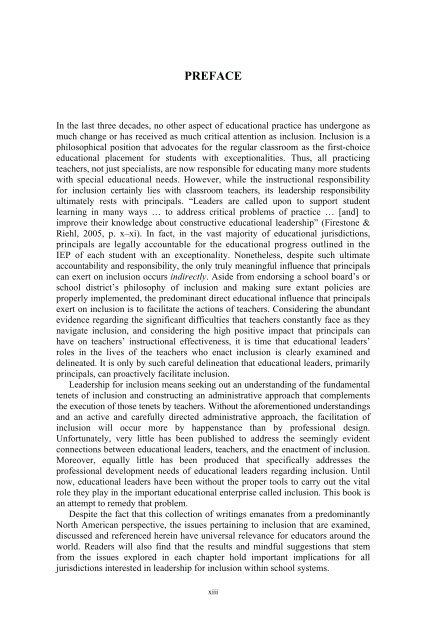Leadership for Inclusion
577-leadership-for-inclusion
577-leadership-for-inclusion
- No tags were found...
You also want an ePaper? Increase the reach of your titles
YUMPU automatically turns print PDFs into web optimized ePapers that Google loves.
PREFACE<br />
In the last three decades, no other aspect of educational practice has undergone as<br />
much change or has received as much critical attention as inclusion. <strong>Inclusion</strong> is a<br />
philosophical position that advocates <strong>for</strong> the regular classroom as the first-choice<br />
educational placement <strong>for</strong> students with exceptionalities. Thus, all practicing<br />
teachers, not just specialists, are now responsible <strong>for</strong> educating many more students<br />
with special educational needs. However, while the instructional responsibility<br />
<strong>for</strong> inclusion certainly lies with classroom teachers, its leadership responsibility<br />
ultimately rests with principals. “Leaders are called upon to support student<br />
learning in many ways … to address critical problems of practice … [and] to<br />
improve their knowledge about constructive educational leadership” (Firestone &<br />
Riehl, 2005, p. x–xi). In fact, in the vast majority of educational jurisdictions,<br />
principals are legally accountable <strong>for</strong> the educational progress outlined in the<br />
IEP of each student with an exceptionality. Nonetheless, despite such ultimate<br />
accountability and responsibility, the only truly meaningful influence that principals<br />
can exert on inclusion occurs indirectly. Aside from endorsing a school board’s or<br />
school district’s philosophy of inclusion and making sure extant policies are<br />
properly implemented, the predominant direct educational influence that principals<br />
exert on inclusion is to facilitate the actions of teachers. Considering the abundant<br />
evidence regarding the significant difficulties that teachers constantly face as they<br />
navigate inclusion, and considering the high positive impact that principals can<br />
have on teachers’ instructional effectiveness, it is time that educational leaders’<br />
roles in the lives of the teachers who enact inclusion is clearly examined and<br />
delineated. It is only by such careful delineation that educational leaders, primarily<br />
principals, can proactively facilitate inclusion.<br />
<strong>Leadership</strong> <strong>for</strong> inclusion means seeking out an understanding of the fundamental<br />
tenets of inclusion and constructing an administrative approach that complements<br />
the execution of those tenets by teachers. Without the a<strong>for</strong>ementioned understandings<br />
and an active and carefully directed administrative approach, the facilitation of<br />
inclusion will occur more by happenstance than by professional design.<br />
Un<strong>for</strong>tunately, very little has been published to address the seemingly evident<br />
connections between educational leaders, teachers, and the enactment of inclusion.<br />
Moreover, equally little has been produced that specifically addresses the<br />
professional development needs of educational leaders regarding inclusion. Until<br />
now, educational leaders have been without the proper tools to carry out the vital<br />
role they play in the important educational enterprise called inclusion. This book is<br />
an attempt to remedy that problem.<br />
Despite the fact that this collection of writings emanates from a predominantly<br />
North American perspective, the issues pertaining to inclusion that are examined,<br />
discussed and referenced herein have universal relevance <strong>for</strong> educators around the<br />
world. Readers will also find that the results and mindful suggestions that stem<br />
from the issues explored in each chapter hold important implications <strong>for</strong> all<br />
jurisdictions interested in leadership <strong>for</strong> inclusion within school systems.<br />
xiii




